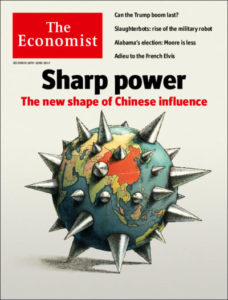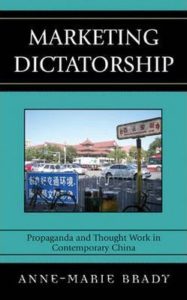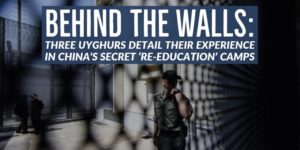 Chinese educators must respond to “false ideas and thoughts” when teaching political and ideological classes, President Xi Jinping said, in a sensitive year that marks the 30th anniversary of student-led protests around Tiananmen Square, Reuters reports:
Chinese educators must respond to “false ideas and thoughts” when teaching political and ideological classes, President Xi Jinping said, in a sensitive year that marks the 30th anniversary of student-led protests around Tiananmen Square, Reuters reports:
“It is essential to gradually open and upgrade ideological and political theory courses in primary, secondary and tertiary schools, which is an important guarantee for training future generations who are well-prepared to join the socialist cause,” media paraphrased Xi as saying.
“Ideological and political courses should deliver the country’s mainstream ideology and directly respond to false ideas and thoughts.”
Xi has sought to tighten the party’s ideological grip on campuses and curb the spread of ‘Western values’ since he took power, SCMP adds.
In the latest ideological broadside, China’s populist Global Times newspaper has used Friday’s Christchurch shooting to launch a scathing critique of Western democracy, reports suggest:
In an editorial piece, the Communist Party-controlled newspaper warned: “The West is entering a problematic period that strikes at its very foundation.” Saying the New Zealand shooting, which left 50 dead, “exposes Western flaws”, the paper went on to attack Muslim immigration and democracy.
“Immigrants, especially Muslims, cannot integrate into Western society,” the piece reads. “The Western political system discourages overall planning and long-term solutions. Poor political and social governance is common.”
 Perhaps that is why the perpetrator of the outrage made clear that he aligns closely with the ideology of China. “The nation with the closest political and social values to my own is the People’s Republic of China,” he wrote in his turgid ‘manifesto’, suggesting that its “lack of diversity” made it “strong”.
Perhaps that is why the perpetrator of the outrage made clear that he aligns closely with the ideology of China. “The nation with the closest political and social values to my own is the People’s Republic of China,” he wrote in his turgid ‘manifesto’, suggesting that its “lack of diversity” made it “strong”.
Observers are mistaken in viewing China as an authoritarian regime that is successful at long-term planning, notes Roman Krznaric. History has few, if any, examples of dictators who remain benign and enlightened for very long (witness, for instance, China’s record on human rights), he writes for the BBC:
Moreover, there is little evidence that authoritarian regimes have a better record on long-term thinking and planning than democratic ones: Sweden, for instance, manages to generate almost 60% of its electricity through renewables without having a despot in charge (compared to only 26% in China).
To judge by the latest headlines about Chinese theft of national security secrets, vigilance needs to be directed outward, toward those who seek to erode the foundations of our democratic freedoms, argues Martha Bayles, the author of Through a Screen Darkly: Popular Culture, Public Diplomacy, and America’s Image Abroad (Yale 2014).
It’s hard to coin a new term, but the National Endowment for Democracy did just that with its “Sharp Power and Rising Authoritarian Influence” report released two years ago, she writes for the American Interest:
From its earliest days the CCP has embraced Lenin’s 1925 dictum that “of all the arts, the most important for us is the cinema.” Unlike their counterparts in liberal democracies, Chinese analysts, strategists, and policy-makers pay extremely close attention to the narratives being purveyed to the masses by popular culture. Under the “core leadership” of Xi Jinping, the correct “guidance” of the newly consolidated media, publishing, and cultural industries of China is an urgent priority.
 On democracy and human rights [in China], it is important for the United States to continue to speak out and to strive to be a better example for other countries, argues Brookings analyst David Dollar, especially when the U.N. human rights apparatus has largely become subservient to authoritarians.
On democracy and human rights [in China], it is important for the United States to continue to speak out and to strive to be a better example for other countries, argues Brookings analyst David Dollar, especially when the U.N. human rights apparatus has largely become subservient to authoritarians.
The EU’s current policy toward China should be updated to reflect the country’s continued authoritarian turn, argues Jonas Parello-Plesner, a Non-Resident Senior Fellow with the German Marshall Fund. Chinese state-owned companies have increased their investments in European countries, including notably in 13 maritime ports, with the most emblematic being COSCO’s takeover of the port in Piraeus in Greece, he adds:
These investments fit into a larger strategic tapestry, and they are part of enacting official policy on creating gateways for the Maritime Silk Road as part of the Belt and Road initiative. There is suspicion that large investments of this kind could entail broader political influence in Europe. For example, such economic considerations could have played a role in Greece blocking an EU human rights statement on China in 2017.
Taiwan faces a unique challenge to its democratic form of governance from mainland China, notes Brookings expert Ryan Hass:
Beijing uses a range of tools to influence attitudes in Taiwan. These include squeezing Taiwan’s international space through diplomatic isolation, co-opting Taiwan’s companies and its best talents through incentives to relocate to the mainland, exercising military power along Taiwan’s periphery, and penetrating Taiwan’s political system with monetary, cyber, and media tools.
 Following reports of forced labor, political indoctrination, abuse, and deaths within Xinjiang’s internment camps, the U.S. co-hosted a U.N. Human Rights Council side event on Xinjiang alongside Canada, Germany, the Netherlands, and the U.K., adds China Digital Times. This comes in the wake of Uyghurs around the world increasingly pressuring Beijing to reveal details about their disappeared loved ones, and U.N. High Commissioner for Human Rights Michelle Bachelet’s second request to gain access to the region.
Following reports of forced labor, political indoctrination, abuse, and deaths within Xinjiang’s internment camps, the U.S. co-hosted a U.N. Human Rights Council side event on Xinjiang alongside Canada, Germany, the Netherlands, and the U.K., adds China Digital Times. This comes in the wake of Uyghurs around the world increasingly pressuring Beijing to reveal details about their disappeared loved ones, and U.N. High Commissioner for Human Rights Michelle Bachelet’s second request to gain access to the region.







